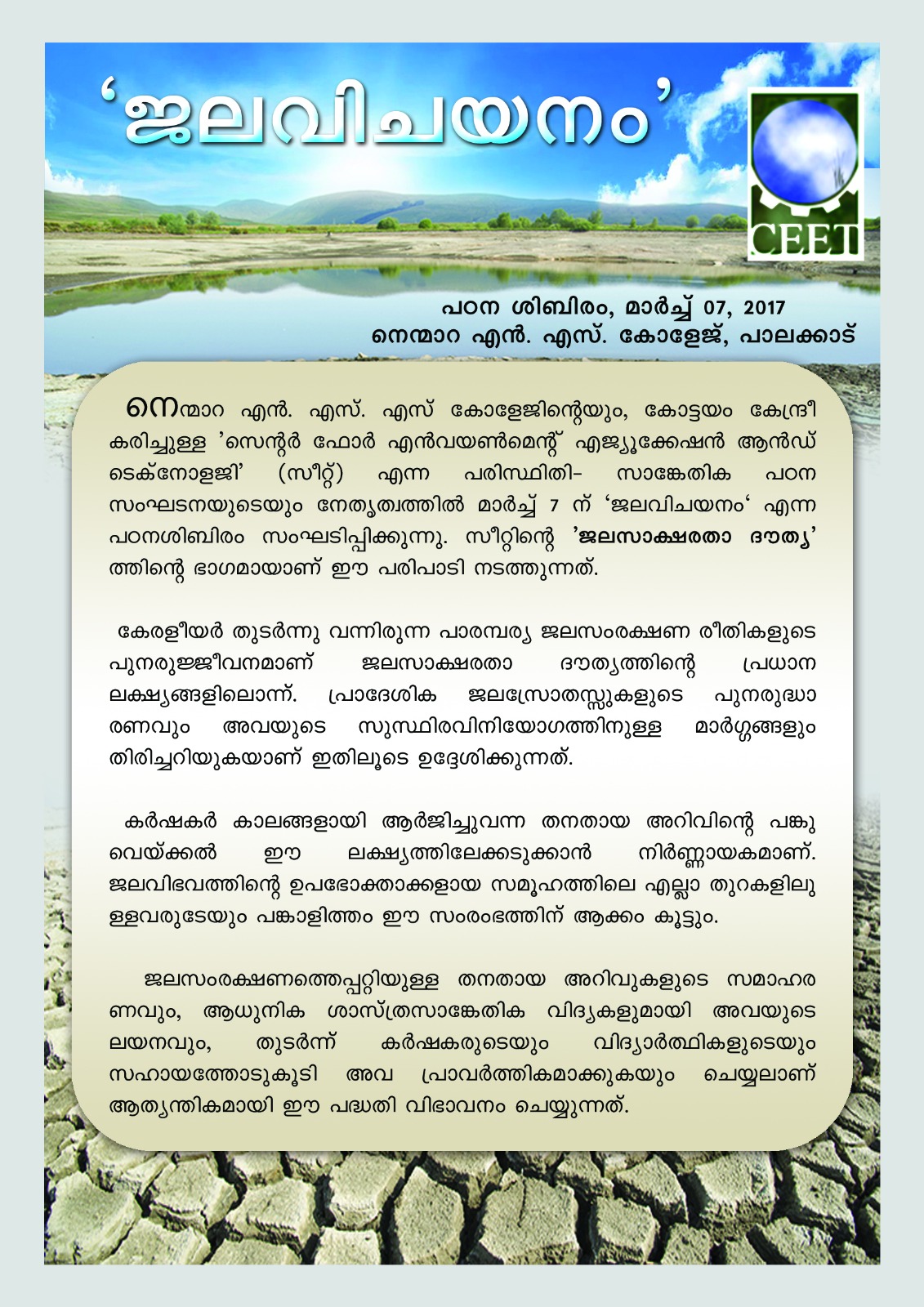Centre for Environment Education and Technology (CEET)
Kiranam, Arpookara East P.O.
Kottayam, Kerala, India - 686008
P: +91 2594458, +91 9447 779 269 | E: ceet.india@gmail.com
Kiranam, Arpookara East P.O.
Kottayam, Kerala, India - 686008
P: +91 2594458, +91 9447 779 269 | E: ceet.india@gmail.com
News, Reports and Opinions
CEET initiated its water literacy programme at Palakkad
CEET initiated its water literacy programme at Palakkad. A beginning, from the grass route level, together with Nemmara NSS College. Thanks to the vibrant Principal Dr. G. Pramod, Mrs, Seema, local coordinator and department of Zoology who were so enthusiastic about sharing the knowledge on water resources, role of farmers in enriching ground water, revival of small water bodies and more. ..
CEET initiated its water literacy programme at Palakkad. A beginning, from the grass route level, together with Nemmara NSS College. Thanks to the vibrant Principal Dr. G. Pramod, Mrs, Seema, local coordinator and department of Zoology who were so enthusiastic about sharing the knowledge on water resources, role of farmers in enriching ground water, revival of small water bodies and more. ..
Bisphenols are everywhere
Bisphenols are everywhere. Their degradation products are also found in cord serum indicating that maternal exposure to such compounds is unsafe. There is a constant increase in infertility, birth defects and neurodevelopment disorders. The exposure of endocrine disrupting compounds on constant basis may have undesired health effects. Scientific reports on animal studies also bring disturbing news.
Bisphenols are everywhere. Their degradation products are also found in cord serum indicating that maternal exposure to such compounds is unsafe. There is a constant increase in infertility, birth defects and neurodevelopment disorders. The exposure of endocrine disrupting compounds on constant basis may have undesired health effects. Scientific reports on animal studies also bring disturbing news.
Don’t forget to wash your hands!!!
The so called endocrine disrupting chemicals (Hormone mimicking) has variety of sources. They may easily enter into our body through both dermal and dietary exposures. Some of the chemical from this category may easily mark their entry into human body. Chemicals from bisphenol family are perhaps the best example.
The so called endocrine disrupting chemicals (Hormone mimicking) has variety of sources. They may easily enter into our body through both dermal and dietary exposures. Some of the chemical from this category may easily mark their entry into human body. Chemicals from bisphenol family are perhaps the best example.
Pamba Walk:
A group of Environmentalist walk through the shores of Pamba River, one of the sacred rivers of K erala, for its protection.
A group of Environmentalist walk through the shores of Pamba River, one of the sacred rivers of K erala, for its protection.
Bharathapuzha, the pride of Kerala, looks to its uncertain future!!
Bharathapuzha (Nilanadi) ,the second largest river of Kerala is dry in summer months resulting in water shortage to Palakkad,Thrissur and Malappuram district of Kerala.
Bharathapuzha (Nilanadi) ,the second largest river of Kerala is dry in summer months resulting in water shortage to Palakkad,Thrissur and Malappuram district of Kerala.
Nanotechnology: Serious Impact on Health
Environmental pollution including carbon particles emitted by car exhaust, smoking and long term inhalation of dust of various origins have been recognized as risk factors causing chronic inflammation of the lungs.
Environmental pollution including carbon particles emitted by car exhaust, smoking and long term inhalation of dust of various origins have been recognized as risk factors causing chronic inflammation of the lungs.
MICROBIAL FUEL CELLS: Can a microbe make electricity from bad wine??
A team of scientists in India demonstrates that a microbe can act as a biocatalyst in a microbial fuel cell and produce electricity. An observation that may bring a breakthrough in green technology...
A team of scientists in India demonstrates that a microbe can act as a biocatalyst in a microbial fuel cell and produce electricity. An observation that may bring a breakthrough in green technology...
Copenhagen Climate Change Conference ends with non-legally binding agreement
The much expected climate change conference in Copenhagen ended with a non-legally binding agreement which the parties said “politically important”.
The much expected climate change conference in Copenhagen ended with a non-legally binding agreement which the parties said “politically important”.
Negotiations toward a new global climate change
(Climate Change Conference Poznan, Poland, 1-12 December 2008) Poznan, Poland is on limelight from 1st to 12th December. Stage has been setup for the United Nations climate change conference here. The two-weekmeeting, the fourteenth conference of the 192 Parties to the United Nations Framework Convention on climate change (UNFCCC) and the fourth meetingof the 183 Parties to the Kyoto Protocol, is the half-way mark in the negotiations on an motivated and successful international climate change deal.
(Climate Change Conference Poznan, Poland, 1-12 December 2008) Poznan, Poland is on limelight from 1st to 12th December. Stage has been setup for the United Nations climate change conference here. The two-weekmeeting, the fourteenth conference of the 192 Parties to the United Nations Framework Convention on climate change (UNFCCC) and the fourth meetingof the 183 Parties to the Kyoto Protocol, is the half-way mark in the negotiations on an motivated and successful international climate change deal.
WAKE UP TO CLIMATE CHANGE!
By Santhi Prabha
So what is the big deal? Shall we have to fret about a possible mount of a few insignificant degrees in the earth’s average surface temperature? Is it like the change we often experience between cool morn and hot noon or between March and June or even between yesterday and today? Mind! We are dealing not with usual swing in local weather but the factual deal over millennia-the projected Global Climate Change!!!. Time has brought the issue out from the corner science columns of inner pages of daily broadsheets world wide and shrieked out for consideration. Something among the mass have been set in motion and now the war has begun in right earnest. Santhi Prabha writes-
By Santhi Prabha
So what is the big deal? Shall we have to fret about a possible mount of a few insignificant degrees in the earth’s average surface temperature? Is it like the change we often experience between cool morn and hot noon or between March and June or even between yesterday and today? Mind! We are dealing not with usual swing in local weather but the factual deal over millennia-the projected Global Climate Change!!!. Time has brought the issue out from the corner science columns of inner pages of daily broadsheets world wide and shrieked out for consideration. Something among the mass have been set in motion and now the war has begun in right earnest. Santhi Prabha writes-
Yet another meet: Promises are on the high!!
The G-8 nations’ (group of eight leading industrial nations) meet in Toyako, northern Japan, is reported to have endorsed the idea of cutting global emissions by at least 50 percent by 2050. It is not expected that the present G-8 meet will come up with any workable solution to cut the greenhouse gases.
The G-8 nations’ (group of eight leading industrial nations) meet in Toyako, northern Japan, is reported to have endorsed the idea of cutting global emissions by at least 50 percent by 2050. It is not expected that the present G-8 meet will come up with any workable solution to cut the greenhouse gases.
Drinking water MDG target met, sanitation lags behind
According to recent estimates, India and Nepal have already met their MDG water targets, but sanitation coverage remains poor (source: infochangeindia.org).
According to recent estimates, India and Nepal have already met their MDG water targets, but sanitation coverage remains poor (source: infochangeindia.org).
Crop Damage Due to Untimely Rain in Kerala Points Climate Change?
The untimely rain in Kerala, the southern state of India, which hit the entire region since March 14, 2008 has caused crop damage and flooding. Experts suggest that this phenomenon is a clear evidence of climate change which results unexpected variations in the climate and it interferes with the seasonal crop production.
The untimely rain in Kerala, the southern state of India, which hit the entire region since March 14, 2008 has caused crop damage and flooding. Experts suggest that this phenomenon is a clear evidence of climate change which results unexpected variations in the climate and it interferes with the seasonal crop production.
Early warnings on water issues
Highlights from assessment activities over two decades by UNEP and other collaborating centres, which are used to establish present and future water trends,
Highlights from assessment activities over two decades by UNEP and other collaborating centres, which are used to establish present and future water trends,


